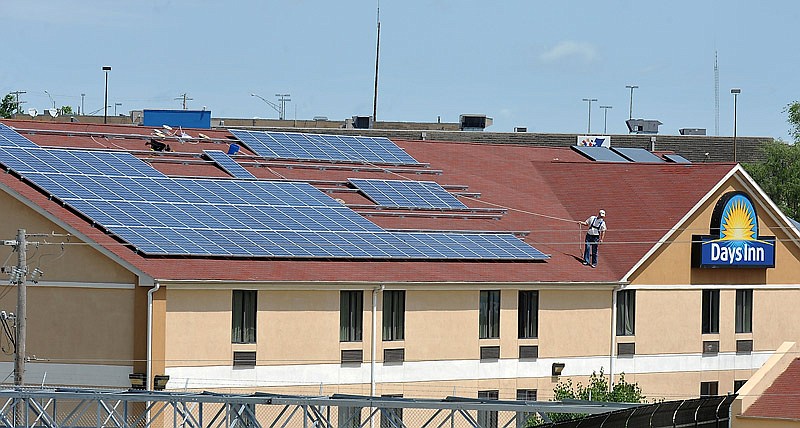During more than four decades working with solar energy, Vaughn Prost has seen the industry transform from a fledgling expensive experimental technology into a cheap form of clean electricity.
Prost, founder and CEO of Jefferson City-based Missouri Solar Applications, believes a bill working its way through the Missouri General Assembly could curb sales of solar panels to residential and business customers.
Proponents of the bill, including its author, said it simply requires users of private energy systems to pay their fair share for electrical maintenance and infrastructure.
If passed, House Bill 340 will allow utilities and electric cooperatives to charge "consumer-generators," like people or businesses with solar panels on their roofs, a fee of up to 75 percent of the cost of a utility or electrical cooperative's monthly service charge. So, for example, a customer with a monthly bill of $12 could have to pay an additional $9 per month.
The bill also requires consumer generators to install surge-protection systems, paid for by the owner of the system. Both provisions would apply only to systems installed after Aug. 28, 2017.
"It will reduce our ability to sell solar, which means that reduces our employees and makes it harder to sell solar," Prost said.
State Rep. Travis Fitzwater, R-Holts Summit, introduced the bill in January. Fitzwater said the bill protects consumer generators by retaining the net metering law for solar panel owners. This allows consumer generators to sell power back to utilities when they generate more power than they use.
Fitzwater said he wants consumer generators to pay their fair share for grid maintenance. Currently, he said, consumer generators pass grid maintenance costs on to other users, like low-income families, who get all of their power from utilities.
"If you're not buying energy as a solar user, but you're putting energy back on the grid, then the energy companies aren't recouping those costs from you," Fitzwater said. "They're recouping it from your neighbor."
Prost argued the opposite is true.
"They don't have to build as much or upgrade their transit lines because you're taking a load off," Prost said. "Really, you're reducing the demand on their grid by producing your own power."
Prost also questioned the provision that requires surge protection because, he said, all solar panels are already designed to be surge protected. This, he said, is simply designed to drive up the cost of new systems. Fitzwater acknowledged that provision was a redundant late amendment to the House bill, but he wants it removed from the final Senate bill.
The House passed the bill April 3. Now the Senate Commerce, Consumer Protection, Energy and Environment Committee is considering it. For it to become law, the full Senate must still debate and pass it, sending it to Gov. Eric Greitens' desk before the 2017 legislative session ends May 12.
An Ameren Missouri spokesman referred questions to Trey Davis, president of the Jefferson City-based Missouri Energy Development Association, which lobbies lawmakers on behalf of state utilities including Ameren. Davis said MEDA's members own a large portfolio of renewable energy power plants including solar, wind and hydroelectric power plants.
Still, the modern grid's needs are changing. A January U.S. Department of Energy study found the electric system "faces imminent danger" from cyber attacks. So, Davis emphasized, investments must be made to modernize the aging electric grid.
"Much of Missouri's utility infrastructure is 50 years old or or older," Davis said. "Since that time, our industry experienced decades of load growth. Customers' expectations are on the rise, technology is evolving rapidly, and there is a strong need to replace and modernize our aging infrastructure."
Last year, Missouri's solar electric industry employed 3,148 people, according to a January Department of Energy report. Energy production from fossil fuels employed 3,246 people. Just 3.5 percent of the state's energy came from renewable sources in 2016, with most solar energy coming from panels affixed to homes or businesses, according to the U.S. Energy Information Administration.
Zachary Wyatt-Gomez, executive director of the Missouri Solar Energy Industries Association, said more than 2,000 jobs will eventually be lost if HB340 becomes law.
Founded by Prost in 2008, Missouri Solar Applications installs commercial and residential solar systems with capacities from 5-100 kilowatts. Days Inn and and Legends Bank are just two of its clients in Jefferson City.
Prost saw the company grow to 20 employees at its peak two years ago, when generous state rebates for solar panels expired. Today, the company employs 12 people.
He said despite the absence of rebates to drive down costs, solar installation is still a viable business in Missouri. Prost fears, though, if the bill passes, he will need to cut employees as demand for solar panels slows.
"Most people buy for the economic benefit of it," Prost said. "There are a few really green people who buy to reduce their carbon footprint, but it would affect our employment."
Jefferson City's Best Western Capital Inn was built in 2007 and added a solar system installed by Missouri Solar Applications in 2011. Kelsey Brown, the hotel's general manager, said the system cost $100,000-$200,000.
Brown said the panels provide less than 20 percent of the hotel's electricity, but the panels come with a 20-year warranty. Best Western also gives hotel franchises awards and incentives for having environmentally friendly buildings.
Brown said any additional expenses could prevent the hotel from adding more solar panels in the future.
"That would definitely deter us from doing it," she said.

